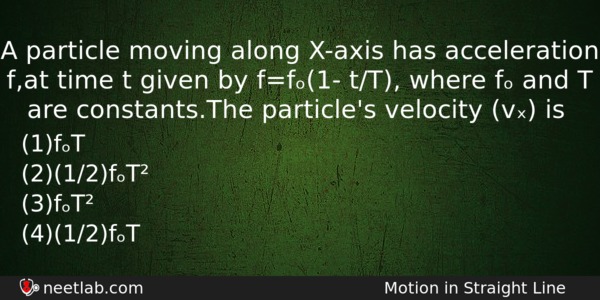| ⇦ | 
| ⇨ |
A particle moving along X-axis has acceleration f,at time t given by f=fₒ(1- t/T), where fₒ and T are constants. The particle’s velocity (vₓ) is
Options
(a) fₒT
(b) (1/2)fₒT²
(c) fₒT²
(d) (1/2)fₒT
Correct Answer:
(1/2)fₒT
Explanation:
Acceleration, f = dv/dt = f₀[1-(t/T)]
dv = f₀[1-(t/T)]dt —–(i)
On integrating Equation (i) both sides, we get
.·. v = f₀t – (f₀/T)(t²/2)dt + C —–(ii)
After applying boundery conditions v = 0 at t = 0, we get
Therefore, C = 0
v = f₀t – (f₀/T)(t²/2)dt —–(iii)
As, f = f₀[1-(t/T)]
When, f = 0,t = T
Substituting, t = T in Equation (iii), then velocity
vₓ = f₀T – (f₀/T)(T²/2)
= f₀T – (1/2)f₀T = (1/2)fₒT
Related Questions: - A liquid wets a solid completely. The meniscus of the liquid in a sufficiently long
- In an orbital motion, the angular momentum vector is
- If radius of the ₁₃Al²⁷ nucleus is taken to be Rᴀı, then the radius of ₅₃Te¹²⁵ nucleus
- The name of ions knocked out from the hot surface is
- A 1 µA beam of protons with a cross-sectional area of 0.5 sq.mm is moving with a velocity
Topics: Motion in Straight Line
(93)
Subject: Physics
(2479)
Important MCQs Based on Medical Entrance Examinations To Improve Your NEET Score
- A liquid wets a solid completely. The meniscus of the liquid in a sufficiently long
- In an orbital motion, the angular momentum vector is
- If radius of the ₁₃Al²⁷ nucleus is taken to be Rᴀı, then the radius of ₅₃Te¹²⁵ nucleus
- The name of ions knocked out from the hot surface is
- A 1 µA beam of protons with a cross-sectional area of 0.5 sq.mm is moving with a velocity
Topics: Motion in Straight Line (93)
Subject: Physics (2479)
Important MCQs Based on Medical Entrance Examinations To Improve Your NEET Score
18000+ students are using NEETLab to improve their score. What about you?
Solve Previous Year MCQs, Mock Tests, Topicwise Practice Tests, Identify Weak Topics, Formula Flash cards and much more is available in NEETLab Android App to improve your NEET score.
Share this page with your friends

Leave a Reply